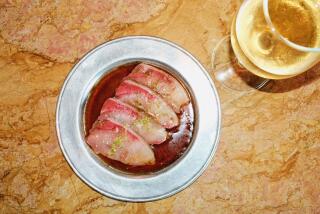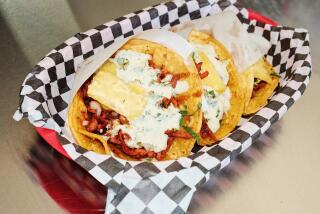Soju Makes a Splash in Southland
- Share via
Bloody Marys, screwdrivers and Bay Breezes are popular drinks at Mutt Lynch’s in Newport Beach -- and that’s a pretty good trick, considering that the place doesn’t have a full liquor license.
Mutt Lynch’s, which is approved to sell only beer and wine, is one of hundreds of California restaurants that in the last year have taken advantage of what regulators concede is a loophole in the state’s alcoholic beverage rules.
They can get away with it thanks to soju, a clear distilled spirit made in South Korea and Japan from a variety of ingredients that can include rice, barley and even sweet potatoes.
Think of it as vodka light.
Because of a 1999 state law pushed by Korean restaurant owners, soju has a unique exemption among distilled spirits in California, and spots such as Mutt Lynch’s are taking full advantage. (New York has passed a similar measure.)
“We started in the spring, and I would never have thought we would go through so much of it,” said Mike Vayner, Mutt Lynch’s general manager. His bartenders pour about four cases worth of the Han brand of soju a week, using it to mix $4.75 well drinks.
Lawmakers granted soju its exemption because of its status as the “social and national” drink of the Korean community, explained Pat Deasy, a regulator with the California Department of Alcoholic Beverage Control. For the most part, its sales have been limited to Korean, along with some Japanese, eateries.
But this year Progressive Beverages of Culver City began importing the Han brand from a Korean maker and marketing it to mainstream restaurants as a vodka substitute.
A start-up company that has designed its business strategy around introducing soju to American consumers, Progressive puts the beverage through a filtering process to give it a flavor closer to vodka. To emphasize the link, Progressive packages its soju in a vodka-style clear bottle, complete with white label and black-and-gold closure.
“The product needed to be translated for the American marketplace,” said Bill Palmer, Progressive’s president. “We think this can become a major category like Scotch or vodka.”
Palmer counts 500 restaurants as clients and said he was adding about 50 a month. Jinro America Inc., the U.S. arm of Korea’s largest soju maker, also is pushing into the mainstream market.
To be sure, no one is accusing the restaurants using soju of doing anything wrong. Although the loophole might not be “equitable,” it is entirely legal, Deasy of the ABC said.
Still, as soju’s utility as a drink mixer grows, industry rivals are starting to question its special status.
“If they can get a 48-proof drink into an account with just a beer and wine license, why can’t we get a [low alcohol] vodka in also?” asked Tim Clarke, chief executive of San Francisco-based Infinite Spirits, which makes the Shakers brand of vodka.
Deasy noted that few anticipated this ruckus when the soju exclusion was passed five years ago. “This was not how the law was originally intended,” he said.
Indeed, the soju exemption was tailored strictly with an ethnic community’s mores in mind.
To qualify, the beverage has to be imported. An American-made soju, even with an identical formula, would be treated as hard liquor. Soju cannot have an alcohol content of more than 24% by volume. (That compares with 40% in a typical vodka.) And the word “soju” has to appear on the bottle.
Panini Coffee & Cafe in Marina del Rey began selling the Han brand of soju in drinks two months ago and found that it was eating into beer sales. That’s just fine with Angel Mones, the cafe’s general manager. He charges $3.75 for a beer and $6 for a soju drink.
Meanwhile, a restaurant like Panini shells out $300 in origination fees for its beer and wine license, and must pay a $300 annual renewal fee. A full liquor license, by comparison, goes for $12,000 and carries a $758 annual renewal fee.
The number of full liquor licenses also is limited by state law to no more than one per every 2,000 inhabitants in a county. So they are relatively tough to come by.
As more beer-and-wine joints use soju as a backdoor way to establish a fuller bar business, those who paid for the more costly liquor licenses are bound to start grumbling.
“We should make sure that everybody is abiding by the letter and the spirit of the law,” said Berman Obaldia, a vice president with the Distilled Spirits Council of America.
Deasy agrees. He said the expanded use of soju “is right on the fence line.”
“If this becomes problematic,” he added, “the Legislature may take another look at this.”
More to Read
Inside the business of entertainment
The Wide Shot brings you news, analysis and insights on everything from streaming wars to production — and what it all means for the future.
You may occasionally receive promotional content from the Los Angeles Times.











